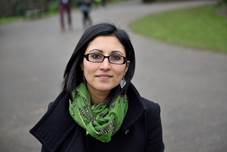Kindness is the oil that takes the friction out of life
By Aliya Mughal

Supporting the work of mental health charities is something I’ve long been committed to, personally and professionally. Much of this comes down to having known friends and family members, among others, to have endured struggles where they could have or did find solace and support from others.
So I was glad to get the chance to be a mentor on the Get Connected programme. The volunteer training was invaluable. But more than anything, working with someone, learning about their life, their struggles, their hopes, their ambitions, and guiding them along the way to getting to where they wanted to go, was an enriching experience that taught me several lessons:
Change takes time, be patient.
Recovery and transformation, at whatever level, is a step by step process that involves a few tumbles and falls. It’s something I appreciated intellectually and from personal experience. I became even more aware of this in my relationship with my mentee, for whom it was sometimes hard to stay consistent and committed in the face of psychological and physiological conflicts. I developed a deeper understanding of the need to be patient and supportive, and how important it is to be realistic about the most good we can do within the framework of someone else’s life.
Time is the greatest gift we can share.
Showing up regularly and consistently makes a huge impact. It’s a human commitment to connect, share and support someone that cultivates a sense of responsibility and humility. There were days when I felt low
Help others to help yourself.
Volunteering is a great thing to do for someone else, it’s also a great thing to do for yourself, especially in terms of the “five pathways to wellbeing”, which were part of the volunteer training. These pathways provided a useful mental checklist when I met with my mentee. If she was having a particularly bad day, we’d work on how she might implement small changes in these areas. It’s also an incredibly helpful checklist I apply in my own life:
- Connect with others: talk about what’s troubling you, give voice to your fears, or simply spend some social time in the company of others.
- Be active: movement is medicine, even in the smallest of doses.
- Take notice: observe the world around you, get out of your head and look up to the sky, it strengthens our awareness of the bigger picture and about ourselves.
- Keep learning: challenge yourself, focus on things that interest you. It builds self-esteem and reminds us that we’re more capable and motivated than we sometimes give ourselves credit for.
- Give! Research shows that when we give our time and our energy to someone or something outside our immediate circle of concern, our empathy and our sense of wellbeing grows.
My experience certainly proved all the above to be true. As the philosopher Seneca said:
“Wherever there is a human being, there is an opportunity for a kindness.”
Get Connected is a mentoring scheme offering support from a volunteer mentor or peer mentor. The aim of the project is to increase the confidence, independence and wellbeing of people. Get Connected is open to clients who are supported by Bristol Mental Health partners and clients who have been discharged from, and are no longer being supported by, Bristol Mental Health services.
